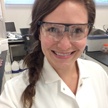-
Asked by Saqqara to Avani, Jeff, Kenzi, Lindsay, Zoe on 18 May 2015.0
-
Zoe GetmanPickering answered on 18 May 2015:
I took a cheese making class my freshman year of college.
The short answer is different aging times, different mold and different bacteria.
Long answer:
Milk is pretty boring by itself. Its got some lactose (a sugar) some casein (protein) and some fat. But mostly its water.
Things get really interesting when you throw in some rennet- an enzyme that makes the protein all stick together so you can separate curds and whey. If you leave it at this step you can have fresh cheese like mozzarella or cottage cheese. If you age it with salt you get something like Parmesan or other super hard grating cheese. Or you can add some bacteria and mold! The bacteria begin digesting the milk and pooping out acid. That makes the cheese sour and softer. Milk+lactobacillus bacteria=yogurt and sour cream.
There are different sorts of mold you can add to add different flavors. The mold digests your cheese curds to make them smooth. If you add Penicillium mold to the outside of the cheese you get a fuzzy white rind on your cheese like Brie and Camembert. These are called soft ripened cheese. If you add different Penicillium molds to holes in the inside you get smelly strong flavored blue cheese. If you wash your cheese with Brevibacterium linens you get an orange mold on top and a cheese that is super stinky called a wash rind cheese. People used to get the bacteria by washing their cheese in the ocean. That Brevibacterium mold is the same one that makes your feet and armpits smell! Yum!
Aging a cheese also changes the taste. Aging gives you stronger mold and bacteria flavors, a more soft and gooey cheese. Or if you don’t have lots of mold your cheese just gets harder and harder. The more a cheese is aged the more expensive it is, and often the better it tastes.
-
-
K. Lindsay Hunter answered on 19 May 2015:
I find that my enjoyment of foods like cheese aren’t really enhanced by knowing what goes into making them, so I did NOT take a cheese-making class in college (or any other time). I blame it on loving the taste of cheese too much (I couldn’t bear to know what that taste *means*!).
My unsophisticated guess was different kinds of bacteria. I’m glad to see I was at least *partly* right, Zoe!
-
Jeff Shi answered on 20 May 2015:
Different types of cheese are aged for different periods of time, sometimes have different strains of bacteria introduced (or none at all), have different amounts of air added to them, and all sorts of creative things cheesemakers can do!






Comments